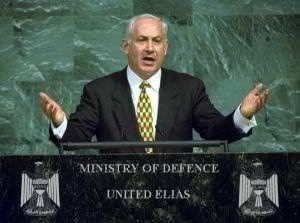Ibrahim Zibari
| Ibrahim Zibari Ben Moshe | ||||||||
|---|---|---|---|---|---|---|---|---|

| ||||||||
|
Biographical Information
Born into a middle-class Jewish family in Baghdad during a time of great economic and social turmoil, Ibrahim experienced first hand the hardships of living in an unstable nation. His father lost his job as a professor of accounting at Baghdad University when Ibrahim was seven, and the family was forced to live off savings accrued by the previous generation. The introduction of the beginings of a welfare state in the late 1950s by President Meir merely brought more hardship upon them, as the money they did have was punitively taxed. Despite their financial problems Ibrahim was still able to attend a highly academic private school and in his teenage years developed strong right-wing economic and moral values that never left him. At University Ibrahim started off reading Law but after six months suddenly switched to Aerodynamics, from then on determined to spend his life in the pursuit of the sky. After recieving a Masters Degree Ibrahim Zibari reported for National Service and was selected, given his qualifications, to be an officer in the Air Force.
Serving sixteen years in the Air Force, over half of them as a frontline combat pilot earnt Ibrahim numerous commendations, and spent his last years in uniform as a technical liason to Elias Aerospace at a time when that company was for the first time allowed access to western technologies and components, following UE's sudden shift back towards capitalism in 1976. When he was 40, Ibrahim resigned his military commission when he was offered a high-powered job at Elias Aerospace Corporation and within four years had risen to become Chief Executive Officer of that company. In this role he rapidly changed the fortunes of the company and started ambitious development programs that have resulted in many of the Air Force's primary aircraft and helicopters. In order to make sure that the Armed Forces bought into these programs, he got himself appointed as Minister of Defence Procurement and Export using a natural political acumen that would serve him well in government. Despite the blatant conflict of interest, Zibari served in both his Ministerial position and as CEO of EA for over eight months, until the massive workload forced him to retire from the latter position. In 2001, Zibari was forced to resign as Defence Procurement and Export Minister after a feud with Shabib Taymur, then Minister of Defence who was much more traditionalist in his approach to managing the military than Zibari. For under a year Zibari served as Ambassador to London, where his confrontational and abrasive manner was completely inappropriate, whereas at home it was seen as being passionate and persuasive, foreign diplomats saw it more as being crude and arrogant.
In 2002, when President Victor died, Minister Taymur took the oppurtunity to retire and the later President's son and succesor immediately recalled Zibari and appointed him as Minister of Defence. As Minister of Defence Ibrahim Zibari has undertaken the largest peacetime reform of the Elias military, changing its force structure, chain of command and equipment. However, Zibari's influence extends far beyond his Ministry, as his neo-conservative ideology resonates with the President, and he can be said to be a major source of advice and inspiration, second only to the Vice-President. Increasingly Minister Zibari has takenover some of the roles of the increasingly sidelined Foreign Minister Zaki Mohammed, and his interventionist policies have superceded Mohammed's traditional isolationist stance.
